Chem 210 reactions - Study guides, Class notes & Summaries
Looking for the best study guides, study notes and summaries about Chem 210 reactions? On this page you'll find 377 study documents about Chem 210 reactions.
Page 4 out of 377 results
Sort by
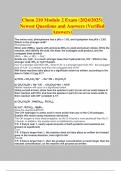
-
Chem 210 Module 2 Exam (2024/2025) Newest Questions and Answers (Verified Answers)
- Exam (elaborations) • 9 pages • 2024
- Available in package deal
-
- $11.49
- + learn more
Chem 210 Module 2 Exam (2024/2025) Newest Questions and Answers (Verified Answers) The amino acid, phenyalanine has a pKa = 1.83, and tryptophan has pKa = 2.83. Which is the stronger acid? Phenylalanine!! Nitric acid (HNO₃) reacts with ammonia (NH₃) to yield ammonium nitrate. Write the reaction, and identify the acid, the base, the conjugate acid product, and the conjugate base product HNO₃ + NH₃ ⇌ NO₃⁻ + NH₄⁺ Amide ion, H₂N⁻, is a much stronger base than hydroxid...
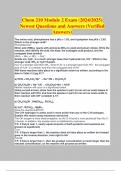
-
Chem 210 Module 2 Exam (2024/2025) Newest Questions and Answers (Verified Answers)
- Exam (elaborations) • 9 pages • 2024
-
- $11.49
- + learn more
Chem 210 Module 2 Exam (2024/2025) Newest Questions and Answers (Verified Answers) The amino acid, phenyalanine has a pKa = 1.83, and tryptophan has pKa = 2.83. Which is the stronger acid? Phenylalanine!! Nitric acid (HNO₃) reacts with ammonia (NH₃) to yield ammonium nitrate. Write the reaction, and identify the acid, the base, the conjugate acid product, and the conjugate base product HNO₃ + NH₃ ⇌ NO₃⁻ + NH₄⁺ Amide ion, H₂N⁻, is a much stronger base than hydroxid...
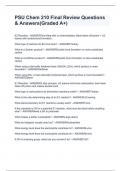
-
PSU Chem 210 Final Review Questions & Answers(Graded A+)
- Exam (elaborations) • 3 pages • 2024
-
Available in package deal
-
- $9.99
- + learn more
PSU Chem 210 Final Review Questions & Answers(Graded A+) E2 Reaction - ANSWEROne-Step with no intermediates, Base takes off proton + LG leaves with double bond formation. What type of carbons do E2 rxns favor? - ANSWERTertiary What is a Zaitsev product? - ANSWERDouble bond formation on more substituted carbon What is a Hoffman product? - ANSWERDouble bond formation on less substituted carbon When using a stericallly hindered base (t-BuOK, LDA), which product is more favorable? - A...
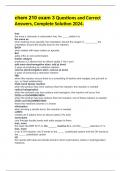
-
chem 210 exam 3 Questions and Correct Answers, Complete Solution 2024.
- Exam (elaborations) • 3 pages • 2024
-
Available in package deal
-
- $9.99
- + learn more
chem 210 exam 3 Questions and Correct Answers, Complete Solution 2024. less the more s character a carbocation has, the _____stable it is the same as when looking at an epoxide, the orientation around the oxygen is _________ the orientation around the double bond in the reactant BrOH when added with base makes an epoxide Br2 adds 2 Brs in anti conformation lindlar catalyst produces a Z alkene from an alkyne (adds 2 Hs in syn) add more electronegative atom, add pi bond 2 ways of pro...
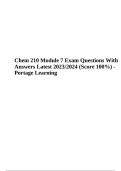
-
Chem 210 Module 7 Exam Review Questions With Answers Latest 2023/2024 (Verified)
- Exam (elaborations) • 14 pages • 2023
-
- $15.49
- + learn more
Chem 210 Module 7 Exam Review Questions With Answers Latest 2023/2024 (Verified) In glycolysis, when glucose enters a cell, it is immediately phosphorylated to form glucose-6-phosphate. The phosphate donor in this reaction is ATP, and the enzyme is ________. Hexokinase Aldolase CoA Phosphohexose isomerase None of the above HEXOKINASE Question 10 3 / 3 pts In the last reaction of glycolysis, ATP is formed by the direct transfer of a phosphate group from a metabolite to ADP. This...
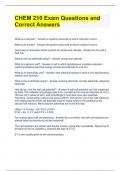
-
CHEM 210 Exam Questions and Correct Answers
- Exam (elaborations) • 4 pages • 2024
-
Available in package deal
-
- $13.09
- + learn more
CHEM 210 Exam Questions and Correct Answers What is a cathode? - Answer-a negative electrode at which reduction occurs What is an anode? - Answer-the positive electrode at which oxidation occurs Good way to remember which is which for anode and cathode - Answer-An Ox and a Red Cat What is the two electrode setup? - Answer-anode and cathode What is a galvanic cell? - Answer-A cell in which spontaneous oxidation-reduction reactions produce electrical energy (anode and cathode Zn and C...
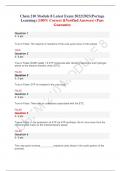
-
Chem 210 Module 8 Latest Exam 2022/2023(Portage Learning) (100% Correct &Verified Answers) (Pass Guarantee
- Exam (elaborations) • 11 pages • 2023
-
Available in package deal
-
- $14.49
- + learn more
Chem 210 Module 8 Latest Exam 2022/2023(Portage Learning) (100% Correct &Verified Answers) (Pass Guarantee True or False: The majority of reactions of the urea cycle occur in the cytosol. TRUE True or False: NADH yields 1.5 ATP molecules after donating electrons and hydrogen atoms to the electron transfer chain (ETC). FALSE True or False: GTP is invested in the urea cycle. FALSE True or False: There are six complexes associated with the ETC. FALSE True or False: In the p...
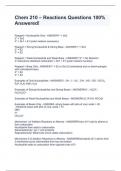
-
Chem 210 – Reactions Questions 100% Answered!
- Exam (elaborations) • 6 pages • 2024
- Available in package deal
-
- $13.99
- + learn more
Reagent = Nucleophile Only - ANSWER1° = Sn2 2° = Sn2 3° = Sn1 + E1 (polar medium necessary) Reagent = Strong Nucleophile & Strong Base - ANSWER1° = Sn2 2° = E2 3° = E2 Reagent = Weak Nucleophile and Weak Base - ANSWER1°/2° = No Reaction 3°/resonance stabilized carbocation = Sn1 + E1 (polar medium necessry Reagent = Base Only - ANSWER1° = E2 or Sn2 (if unhindered and no beta-hydrogen with unhindered base) 2° = E2 3° = E2 Examples of Only Nucleophiles - ANSWERCl⁻, ...
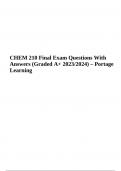
-
CHEM 210 Final Exam Review Questions With Answers | Graded A+ 2023/2024 (Portage Learning)
- Exam (elaborations) • 7 pages • 2023
- Available in package deal
-
- $19.49
- + learn more
CHEM 210 Final Exam Review Questions With Answers | Graded A+ 2023/2024 (Portage Learning) In a particular cell, molecule X binds to an enzyme causing it to stop catalyzing reactions. Molecules X is called what? A. Ligand B. Substrate C. Coenzyme D. Deactivator E. Inhibitor 16. The following are all example of a lipid’s function in cells except _____ A. Energy source B. Structural role in membranes C. Structural role in myelin sheathes D. The basis for dye molecules (carotenoids) E...
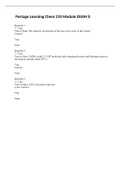
-
Portage Learning Chem 210 Module EXAM 8
- Exam (elaborations) • 12 pages • 2023
-
Available in package deal
-
- $8.49
- + learn more
Portage Learning Chem 210 Module EXAM 8 Question 1 3 / 3 pts True or False: The majority of reactions of the urea cycle occur in the cytosol. Correct! True False Question 2 3 / 3 pts True or False: FADH2 yields 2.5 ATP molecules after donating electrons and hydrogen atoms to the electron transfer chain (ETC). True Correct! False Question 3 3 / 3 pts True or False: ATP is invested in the urea cycle. Correct! True False

$6.50 for your textbook summary multiplied by 100 fellow students... Do the math: that's a lot of money! Don't be a thief of your own wallet and start uploading yours now. Discover all about earning on Stuvia


